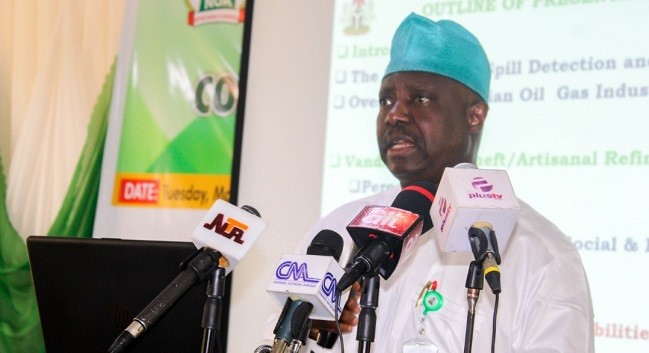Preliminary investigations into the Jan. 16, oil spill near Funiwa offshore facilities off the Atlantic coast, got underway on Friday, January 22, 2021 with a visit by Bayelsa State Government officials, regulatory agencies and representatives of impacted communities.

Fishermen around the Atlantic Ocean coastline had on Jan. 17 sighted and reported an oil leak suspected to be from the Funiwa fields following the leakage of the previous day.
However, the operator of the nearby Funiwa field, Chevron, denied responsibility for the leakage.
Chevron, First Exploration and Production (First E&P) and Conoil Producing Limited have operations near the spill incident location.
Mr Alagoa Morris, an environmentalist and Head of Field Operations, Environment Right Action/Friends of the Environment Nigeria (ERA/FoEN), a civil society body who was part of the delegation, explained that the visit was not the statutory Joint Investigative Visit (JIV).
Morris said that the trip could not be a JIV as none of the oil companies operating in the area was represented adding that it was a fact finding mission to assess the level of impact on the people and environment.
“The visit was an assessment trip to see things and suggest the way forward given the fact that no oil company has owned up, it cannot be a JIV because no oil company was represented so we shall submit an interim report to guide further action,” Morris said.
Also Mr Kiwei Emmanuel, Youth President of Koluama 1, one of the worst hit areas by the spill, said on Saturday that the team was made up of officials of Bayelsa Ministries of Environment, Mineral Resources as well as Senior Special Assistant to Bayelsa Governor on oil and gas.
According to him, the regulators, Department of Petroleum Resources (DPR) and National Oil Spills Detection and Response Agency (NOSDRA) took samples from the sediments at the coastline for laboratory tests to trace the source of pollution.
Emmanuel said that members of the team also saw heaps of fishing nets, fishing gear and accessories destroyed by the oil leak, and traced the spread of the crude along the coast into the creeks and mangrove vegetation.
It was gahthered that NOSDRA had summoned all the oil firms operating in the shallow waters near Koluama in Bayelsa in a bid to identify the source of the leaks which had polluted the area.
Mr Musa Idris, Director-General at NOSDRA, said in a telephone interview that the spill regulatory agency would dispatch its officials to the incident site.
Efforts to speak with Bayelsa Commissioner of Environment, Mr Isemea Gbarambiri, on what the government has done to cushion the effects of the incident on the predominantly fishing residents were unsuccessful.
Several telephone calls to his mobile phone went unanswered, he has yet to reply text messages requesting a response.
By Nathan Nwakamma
